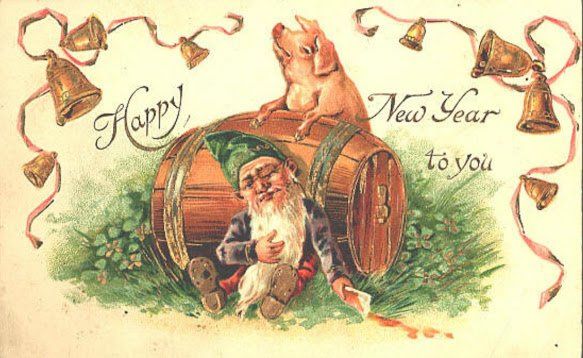J. Mark Lowe
Eating black-eyed peas and something green (cabbage or
greens) on New Year's Day is said to bring good luck and financial prosperity
to the one eating them throughout the rest of the year. My Mom insisted that we
at least have a spoonful of peas. Other lucky foods are lentils, pork (because
chickens scratch backwards, a cow stands still, but a pig roots forward.) and
sauerkraut. In order to take this a step further, some place a silver coin over
the doorway or a penny on the windowsill. I asked several of my friends what
traditions their family or neighbors followed.
On New Year’s Day, it is good luck for a man to be the first
person to enter your house, and bad luck for a woman to be first. John Baker, Jr. remembers men in the
community coming around from house-to-house on New Year’s Day in order to
spread good luck. Several folks shared this similar superstition. Absolutely
nothing should leave your house or home on New Year's Day, including you, until
someone has crossed into your door. You may want to have a family member or
friend visit you on New Year's Day to break the threshold of your doorway
before you go anywhere on the first. The best luck would be a dark-haired tall
man who came bearing gifts of a lump of coal, a silver coin, a bit of bread, an
evergreen sprig or some salt. Beware though, remember it should be a man, not a
woman, and blondes and redheads are additional bad omens. The story is told that on one occasion, a
wife allowed a female friend to come into her house on the Day. Her husband was extremely upset that his wife
allowed the female friend to be the first to come into the house and bring bad
luck. This argument led to a separation
and the couple never reconciled.
 |
| This historic postcard displays many traditional symbols of luck: leprechaun, four-leaf clovers, horseshoe, ringing bells, gold coins and a pig |
There are many traditions about the people with whom you celebrate and activities you are doing both on New Year’s Eve and Day. So depending on your beliefs, the person you were with to celebrate the new year last week is with whom you will spend the next year. There's long been a superstition that if you kiss your true love at midnight on New Year's Eve, you will live in love and happiness with that person for the entire rest of the upcoming year. Plus, whatever you were doing on January 1st is the task you will continue to do all year. I’ve heard from many people that families have avoided have funerals on the 1st because of the superstition. There is one superstition about New Year's Day that if you lend someone money or something of substantial value on the first day of the New Year, you will be loaning money out to people all year long. You're also not supposed to pay off any loan on the first day of the New Year, either. If you cry on New Year's Day, for sad reasons, then you set the tone for a year's worth of sadness and tears. Whatever happens, you should be happy and upbeat all day on New Year's Day in order to ensure a happy year to follow.
Many folks opened the doors or windows of a home at midnight
on New Year’s Eve to let the old year escape.
We also make loud noises at the same time, so we scare away any evil
spirits that might be tempted to come into the house. An Irish tradition
involves banging on the door and walls with Christmas bread to chase the bad
luck out and bring good spirits to the household with the promise of bread
enough in the New Year.
Watch Night began with the Moravians, a small Christian
group with roots in eastern Europe. The first such service was held in 1733 on
the estate of Count von Zinzendorf in Hernhut, Germany. John Wesley, founder of
a Methodist movement, incorporated the Watch Night vigil into the practices of
the early Methodist church. These watch night were not only held on New Year’s
Eve, but one a month and on full moons.
The first such service was held in the United States in 1770 in
Philadelphia.
The end-of-year Watch Night of 1862 took on special
significance and became known as Freedom Eve. On the 22nd of
September 1862, President Abraham Lincoln issued a preliminary Emancipation
Proclamation, which stated, “On the first day of January… all persons held as
slaves within any State, or designated part of a State, the people whereof
shall then be in rebellion against the United States shall be, then,
thenceforward, and forever free.” When the news was received, there were
prayers, shouts and songs of joy as people fell to their knees and thanked God.
Among African-American congregations many have gathered in churches annually on
New Year's Eve ever since, praising God for bringing them safely through
another year and commemorating the significant date in history.
As I leave you to your resolutions, let me share the fate of Ten Little
Resolutions taken from a 1910 Kentucky newspaper. One little resolution keeping it a month is a
chore, never mind, next New Years’ Day you can make at least ten more.
Sources: Mt. Sterling Advocate; Historic Traditions of
Scotland and Ireland;



No comments:
Post a Comment